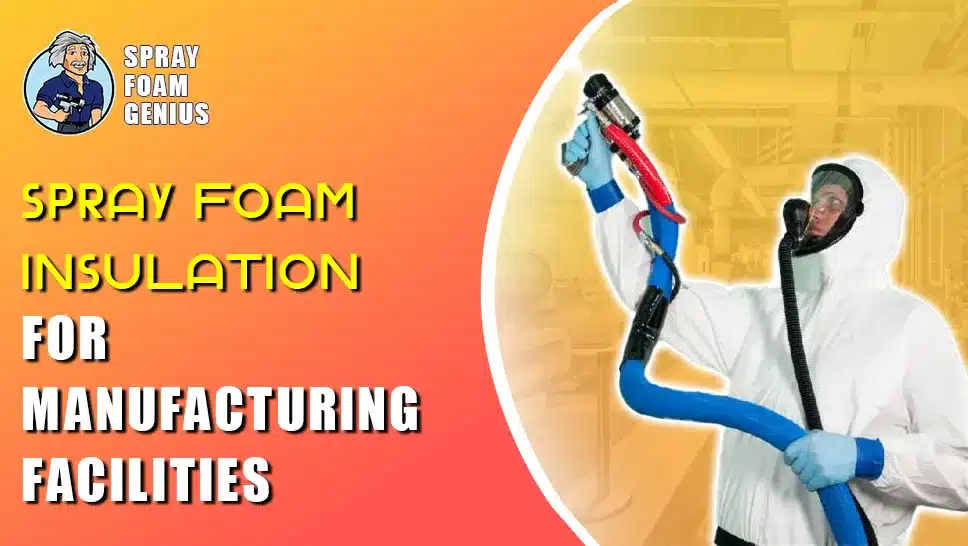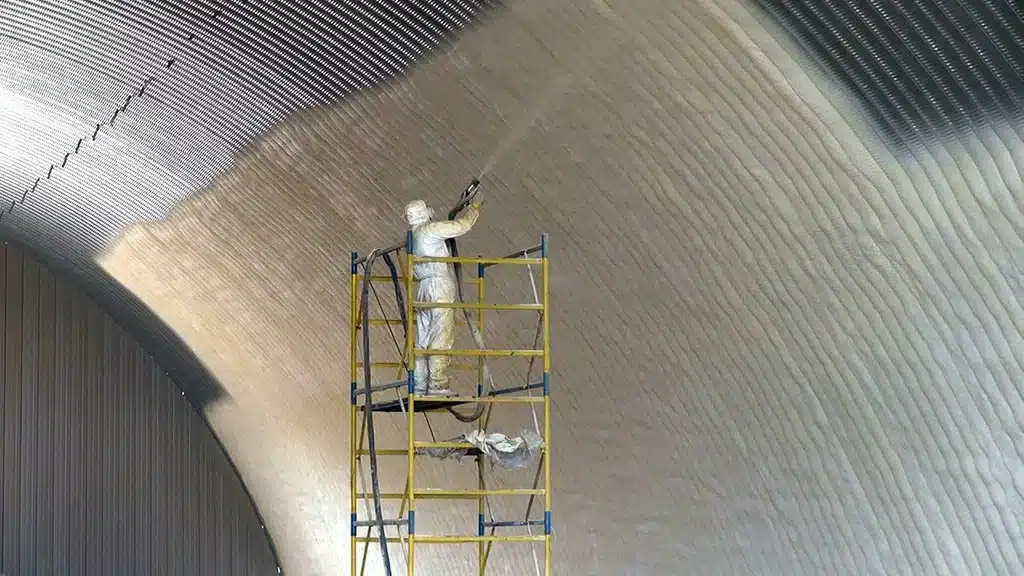
In the ever-evolving landscape of industrial operations, efficiency, safety, and sustainability are top priorities for manufacturing facilities. As a spray foam insulation contractor, understanding the specific needs of these large-scale environments can significantly boost your business. This comprehensive guide will equip you with the essential knowledge to position spray foam insulation as the go-to solution for manufacturing facilities.
Why Spray Foam Insulation is Ideal for Manufacturing Facilities
Manufacturing facilities, by their very nature, are energy-intensive environments. Whether it’s the high demand for heating, ventilation, air conditioning, or maintaining specific temperature controls for production processes, energy efficiency is critical. Spray foam insulation provides a superior solution, delivering multiple benefits that align perfectly with the needs of these facilities.
- Energy Efficiency and Cost Savings:
Spray foam insulation offers exceptional thermal resistance (R-value), which is crucial for maintaining consistent temperatures inside manufacturing facilities. Unlike traditional insulation materials like fiberglass or cellulose, spray foam expands to fill gaps and cracks, creating an airtight seal. This significantly reduces heat transfer, leading to lower energy consumption and substantial cost savings over time. - Moisture and Air Barrier:
Manufacturing facilities often deal with moisture-related issues, particularly in humid environments or those requiring water-based processes. Spray foam acts as an effective moisture barrier, preventing water infiltration and reducing the risk of mold growth. Additionally, it seals off air leaks, which can otherwise lead to energy loss and decreased indoor air quality. - Structural Strength and Durability:
Spray foam insulation contributes to the structural integrity of buildings by adhering to surfaces and adding rigidity. This is particularly beneficial for older manufacturing facilities where maintaining structural strength is vital. The durability of spray foam also means it will not sag or settle over time, ensuring long-term performance. - Soundproofing:
Manufacturing facilities are typically noisy environments, with machinery, tools, and production processes contributing to high levels of sound. Spray foam insulation’s dense composition can help in absorbing sound, thereby reducing noise levels and contributing to a more comfortable working environment. - Compliance with Environmental Regulations:
With increasing pressure on industries to reduce their carbon footprint, spray foam insulation offers an eco-friendly solution. It helps facilities comply with energy codes and green building standards, making it easier for businesses to achieve sustainability goals and adhere to environmental regulations.
Understanding the Installation Process: What Contractors Need to Know
While the benefits of spray foam insulation for manufacturing facilities are clear, the installation process requires a high level of expertise. Here’s what you need to know as a contractor:
- Pre-Installation Assessment:
Begin with a thorough assessment of the facility. Identify areas that require insulation, considering factors like the type of machinery present, potential moisture issues, and existing insulation. Understanding the specific needs of the facility will help you determine the appropriate type and amount of spray foam required. - Material Selection:
There are two main types of spray foam insulation—open-cell and closed-cell. Open-cell foam is softer and more flexible, making it suitable for interior applications where soundproofing is a priority. Closed-cell foam is denser and offers higher R-values, making it ideal for exterior walls and areas where moisture resistance is crucial. Your choice will depend on the facility’s specific needs. - Application Techniques:
Proper application is key to achieving the desired benefits. Ensure that the surface is clean and free of contaminants before applying the foam. Spray foam should be applied in layers, allowing each layer to expand and cure before adding the next. This layered approach ensures complete coverage and maximizes insulation effectiveness. - Safety Precautions:
Spray foam insulation involves the use of chemicals that can be hazardous if not handled correctly. It’s essential to follow all safety protocols, including wearing protective gear, ensuring proper ventilation, and adhering to the manufacturer’s guidelines. Also, inform facility managers about the safety measures and any temporary disruptions to operations during installation. - Quality Control and Inspection:
After installation, conduct a thorough inspection to ensure the foam has adhered properly and there are no missed spots or air gaps. Use infrared cameras or blower door tests to check for any potential leaks. This step is crucial to guarantee the long-term effectiveness of the insulation.
Challenges and Considerations
While spray foam insulation offers numerous advantages for manufacturing facilities, there are some challenges and considerations to keep in mind:
- Cost:
The initial cost of spray foam insulation is higher than traditional insulation materials. However, the long-term savings in energy costs and the extended lifespan of the product often justify the investment. It’s essential to communicate these benefits to facility managers to help them see the value. - Professional Expertise Required:
Installing spray foam insulation requires specialized knowledge and skills. Ensure your team is well-trained and certified to handle the material and equipment. Offering a warranty on your work can also help build trust with clients. - Potential Disruptions to Facility Operations:
Installation in an active manufacturing facility can be challenging. Coordinate with facility managers to schedule the work during downtime or in phases to minimize disruptions. Clear communication is key to ensuring the installation process runs smoothly. - Environmental Impact:
Although spray foam insulation can contribute to a facility’s sustainability goals, it’s important to be aware of the environmental impact of the chemicals used. Look for products that are free from ozone-depleting substances and have low global warming potential (GWP).
Marketing Spray Foam Insulation to Manufacturing Facilities

As a spray foam insulation contractor, marketing your services effectively to manufacturing facilities is crucial. Here are some strategies to help you succeed:
- Highlight Energy Savings and ROI:
Facility managers are always looking for ways to reduce operational costs. Emphasize the energy savings and return on investment (ROI) that spray foam insulation can provide. Use case studies and testimonials to showcase past successes. - Offer Free Assessments:
Provide free facility assessments to identify insulation needs and offer customized solutions. This not only demonstrates your expertise but also helps build relationships with potential clients. - Educate Your Audience:
Create content, such as blogs, videos, and whitepapers, that educates facility managers about the benefits of spray foam insulation. Position yourself as a knowledgeable resource they can trust. - Utilize Local SEO:
Optimize your website and Google Business Profile for local search terms. Manufacturing facilities are often located in industrial areas, so ensuring your business appears in local search results is essential. - Network with Industry Professionals:
Attend industry trade shows, seminars, and networking events where you can connect with facility managers and decision-makers. Building these relationships can lead to long-term contracts and repeat business.
Partner with Us for Expert Marketing Support
Are you ready to expand your business by offering spray foam insulation solutions to manufacturing facilities? At Spray Foam Genius Marketing, we specialize in helping spray foam contractors like you succeed. From professional SEO and Google Business Profile optimization to lead generation and reputation management, we provide the tools you need to grow your business.
Call us at 877-840-FOAM for USA and 844-741-FOAM for Canada visit our website at sprayfoamgeniusmarketing.com, or email us at [email protected] to get started.
- 5 Google My Business Hacks to Double Your Leads for Spray Foam Insulation Contractors - January 14, 2025
- Why Spray Foam Contractors Cannot Ignore Reputation Management in 2025 - January 13, 2025
- Local SEO Secrets Every Spray Foam Contractor Must Know to Win in 2025 - January 13, 2025

